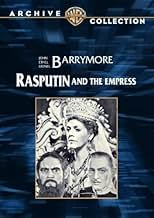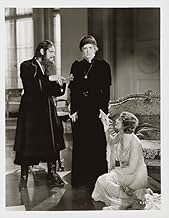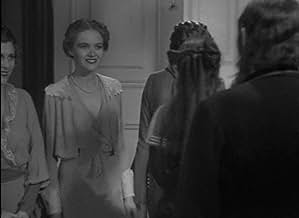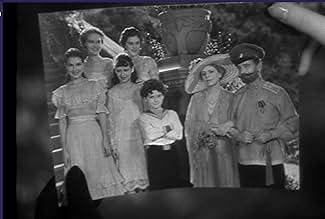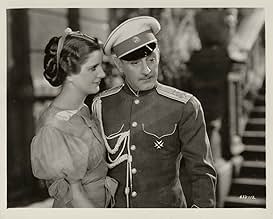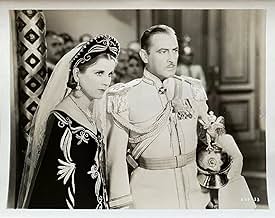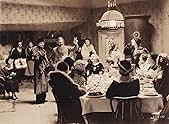CALIFICACIÓN DE IMDb
6.5/10
1.3 k
TU CALIFICACIÓN
Un príncipe planea matar al loco monje Rasputín por el bien del zar, la zarina y Rusia.Un príncipe planea matar al loco monje Rasputín por el bien del zar, la zarina y Rusia.Un príncipe planea matar al loco monje Rasputín por el bien del zar, la zarina y Rusia.
- Dirección
- Guionistas
- Elenco
- Nominado a 1 premio Óscar
- 4 premios ganados y 1 nominación en total
Luis Alberni
- Photographer's Assistant
- (sin créditos)
Mary Alden
- Natasha's Lady in Waiting
- (sin créditos)
Robert Anderson
- Undetermined Secondary Role
- (sin créditos)
Oscar Apfel
- Undetermined Secondary Role
- (sin créditos)
Henry Armetta
- Photographer
- (sin créditos)
Hooper Atchley
- Rasputin's Henchman
- (sin créditos)
Mischa Auer
- Butler Pouring Drinks at Party
- (sin créditos)
Reginald Barlow
- General Who Underestimated the Japanese
- (sin créditos)
Barbara Barondess
- Woman Getting Cigarette
- (sin créditos)
Max Barwyn
- Bald Man Trying to See Duna
- (sin créditos)
Opiniones destacadas
The only film with all three Barrymores together and it's a good film, however, the direction is very poorly done, especially the ending scene.
Other than that, Lionel Barrymore portrays an excellent Rasputin and Ethel Barrymore is wonderful as the Empress Alexandra Fyodorovna. John Barrymore is great as Prince Paul, the assassin of Rasputin (in real life, it was Prince Yussupov who assassinated Rasputin).
This is a good film, but if you want a better interpretation of Rasputin's "reign," rent the 1996 HBO version with Alan Rickman or the 1971 movie, "Nicholas and Alexandra."
Other than that, Lionel Barrymore portrays an excellent Rasputin and Ethel Barrymore is wonderful as the Empress Alexandra Fyodorovna. John Barrymore is great as Prince Paul, the assassin of Rasputin (in real life, it was Prince Yussupov who assassinated Rasputin).
This is a good film, but if you want a better interpretation of Rasputin's "reign," rent the 1996 HBO version with Alan Rickman or the 1971 movie, "Nicholas and Alexandra."
Rasputin and the Empress (1932)
*** (out of 4)
Lionel, John and Ethel Barrymore star in this film, which was the only one that all three legends appeared in together. After her son is near death, Czarina Alexandria (Ethel) lets the monk Rasputin (Lionel) pray with her son who eventually heals and the monk gives credit to God. Saving her son, the monk soon finds himself gaining power inside the government but this doesn't sit well with Prince Chegodieff (John) who will stop at nothing to prove the monk is mad. Apparently MGM was sued due to how inaccurate the story is here so if you want a history lesson you should go read a book but if you want to see all three Barrymore's together then this is the only film out there that will suit you. The film should have been a lot better than it is but the thing drags at several points and I'm sure fifteen or so minutes could have been trimmed from the 123-minute running time, although apparently the film ran longer when originally released. The performances aren't what you'd expect but it's certainly fun seeing the three Barrymore's working together. Lionel actually goes way over the top, which is something you'd expect from John but he actually manages to be quite calm and cool throughout the film. John certainly gives the best performance but it's Lionel who steals the film with his fake beard and over the top antics. Ethel is good in her role as is the supporting work from Ralph Morgan. The costumes and set design are wonderful and I really enjoyed the made up ending, which contains some pretty strong violence.
*** (out of 4)
Lionel, John and Ethel Barrymore star in this film, which was the only one that all three legends appeared in together. After her son is near death, Czarina Alexandria (Ethel) lets the monk Rasputin (Lionel) pray with her son who eventually heals and the monk gives credit to God. Saving her son, the monk soon finds himself gaining power inside the government but this doesn't sit well with Prince Chegodieff (John) who will stop at nothing to prove the monk is mad. Apparently MGM was sued due to how inaccurate the story is here so if you want a history lesson you should go read a book but if you want to see all three Barrymore's together then this is the only film out there that will suit you. The film should have been a lot better than it is but the thing drags at several points and I'm sure fifteen or so minutes could have been trimmed from the 123-minute running time, although apparently the film ran longer when originally released. The performances aren't what you'd expect but it's certainly fun seeing the three Barrymore's working together. Lionel actually goes way over the top, which is something you'd expect from John but he actually manages to be quite calm and cool throughout the film. John certainly gives the best performance but it's Lionel who steals the film with his fake beard and over the top antics. Ethel is good in her role as is the supporting work from Ralph Morgan. The costumes and set design are wonderful and I really enjoyed the made up ending, which contains some pretty strong violence.
A true example of the assembly line style film-making of the old studios, where one doubts if the screenwriter ever visit the set, or did the director ever sit at an editing bench. Lionel Barrymore, however is a treat as the grimy, kooky Rasputin. He doesn't go for one-note scary. He's seen as a fun party animal, a believable healer, and the world's worst dinner guest. Other than that, John is wasted as the hero, as is their sister Ethel.
...forget about it. This film is completely inaccurate in its portrayal of actual events in Russian history. As for the nature and character of the historical figures involved, the three Barrymores give good renditions. There is Ethel Barrymore looking every inch the empress and giving a convincing portrayal of a woman concerned for the welfare of her very ill son - and I would expect that. What I didn't expect is how weird it would be to watch a film in which John Barrymore is the shining hero and Lionel Barrymore is a truly diabolical villain, and each are spectacularly convincing in their portrayals. Lionel is really the center of attention here as he plays the evil Rasputin whose ability to sidestep assassination attempts is legendary, and here a few logical explanations are given to some of his alleged abilities. However, none can explain what happened at the end of his life - how he was poisoned, bludgeoned, shot, and finally thrown into an icy river and still managed to cling to life for awhile.
Although Tsar Nicholas is accurately portrayed as a rather weak willed man and the Romanov marriage is also accurately portrayed as one of the few royal arranged marriages that also turned out to be a love match, there is a mischaracterization of the Tsar as being progressive and wanting a Duma only to have Rasputin defeat that plan. In fact, Nicholas was autocratic in his outlook and distrusted any attempt to give the people more say in their government. This sets up one of the great ironic struggles in the film - that of aristocrat Prince Paul Chegodieff (John Barrymore) wanting more for the peasants in the way of both bread and democracy, and that of peasant mystic Rasputin (Lionel Barrymore) saying that it was God's will that the peasants were poor and powerless. Paul wants to save Russia, Rasputin wants to rule it.
Another piece of fiction shown in the movie for dramatic measure are the public proclamations about the illness of Tsaravich Alexai, the heir to the Russian throne. In fact one of the things that turned the Russian people against the royal family - besides the fact that they were starving during WWI - was that the people assumed that Rasputin's hold over the empress was because they were lovers. The Romanovs did not want it to be known that the only son in the family and heir to the throne had a serious disease - in this case hemophilia - that kept him in very delicate health and would likely lead to a greatly shortened lifespan. They felt it would leave them vulnerable to the overthrowing of their rule. Ironically hiding the truth and leaving Rasputin's relationship to the empress unexplained also led to exactly that.
Watch this one for the high production values and compelling performances by the members of Hollywood's royal family during its golden age, but as for a Russian history lesson, look elsewhere.
Although Tsar Nicholas is accurately portrayed as a rather weak willed man and the Romanov marriage is also accurately portrayed as one of the few royal arranged marriages that also turned out to be a love match, there is a mischaracterization of the Tsar as being progressive and wanting a Duma only to have Rasputin defeat that plan. In fact, Nicholas was autocratic in his outlook and distrusted any attempt to give the people more say in their government. This sets up one of the great ironic struggles in the film - that of aristocrat Prince Paul Chegodieff (John Barrymore) wanting more for the peasants in the way of both bread and democracy, and that of peasant mystic Rasputin (Lionel Barrymore) saying that it was God's will that the peasants were poor and powerless. Paul wants to save Russia, Rasputin wants to rule it.
Another piece of fiction shown in the movie for dramatic measure are the public proclamations about the illness of Tsaravich Alexai, the heir to the Russian throne. In fact one of the things that turned the Russian people against the royal family - besides the fact that they were starving during WWI - was that the people assumed that Rasputin's hold over the empress was because they were lovers. The Romanovs did not want it to be known that the only son in the family and heir to the throne had a serious disease - in this case hemophilia - that kept him in very delicate health and would likely lead to a greatly shortened lifespan. They felt it would leave them vulnerable to the overthrowing of their rule. Ironically hiding the truth and leaving Rasputin's relationship to the empress unexplained also led to exactly that.
Watch this one for the high production values and compelling performances by the members of Hollywood's royal family during its golden age, but as for a Russian history lesson, look elsewhere.
Plot in a Nutshell: Russian Prince Chegodieff (John Barrymore) tries to stop the evil Rasputin (Lionel Barrymore) from exerting his influence over Czarina Alexandra (Ethel Barrymore).
Why I rated it a '7': That's a lot of Barrymore! Admittedly, that fact alone doesn't make it a 7, but seeing the three accomplished siblings together here (for the only time in celluloid history) IS worth a few extra points. This is an interesting tale, showing how an unknown/outsider was able to insert himself into the lives of the Russian royal family and influence them in ways one wouldn't think possible. I will say that the film goes out of its way to denigrate Rasputin. I don't think he needed any help, really, but in addition to his actual crimes, he is shown here to be a war-monger, royal rapist and freedom-hating enemy of the peasants. Lol that's quite a despicable guy! Some reviewers have complained that "Rasputin" is not always true to history (in some ways, it's not), but what this tells me is that Hollywood apparently has been making historically inaccurate films for perhaps longer than anyone thought. If you can forgive it that, it's otherwise pretty entertaining.
Best line: "You know, people with visions like yours, my dear father, are sometimes rather unlucky. There was a general, not long ago, who shot himself in the back. No one could understand quite how he did it!"
Would I watch again (Y/N)?: Yes.
Why I rated it a '7': That's a lot of Barrymore! Admittedly, that fact alone doesn't make it a 7, but seeing the three accomplished siblings together here (for the only time in celluloid history) IS worth a few extra points. This is an interesting tale, showing how an unknown/outsider was able to insert himself into the lives of the Russian royal family and influence them in ways one wouldn't think possible. I will say that the film goes out of its way to denigrate Rasputin. I don't think he needed any help, really, but in addition to his actual crimes, he is shown here to be a war-monger, royal rapist and freedom-hating enemy of the peasants. Lol that's quite a despicable guy! Some reviewers have complained that "Rasputin" is not always true to history (in some ways, it's not), but what this tells me is that Hollywood apparently has been making historically inaccurate films for perhaps longer than anyone thought. If you can forgive it that, it's otherwise pretty entertaining.
Best line: "You know, people with visions like yours, my dear father, are sometimes rather unlucky. There was a general, not long ago, who shot himself in the back. No one could understand quite how he did it!"
Would I watch again (Y/N)?: Yes.
¿Sabías que…?
- TriviaAnnoyed that his brother John Barrymore was trying to show him up by placing his hand on him while he was finishing a scene (an ancient actor's technique for drawing attention to oneself), Lionel Barrymore excused himself from the set and went to the back lot to find a telephone. He then phoned the set and told director Richard Boleslawski that "he'd better advise Mr. John Barrymore to not place his hand on me at the close of this scene, lest I lay one on him!" By the time Lionel returned to the set, John has been advised to keep his hands to himself.
- ErroresThe fact that the Tsarevich was sick was not announced publicly as portrayed in the movie. It was kept a secret.
- Citas
Natasha: You don't like him because he's so outspoken. You don't like his manners. Isn't that it?
Prince Chegodieff: No, that's not it. It, its his, smile. It's like a man-eating shark with a bible under his fin.
- Versiones alternativasUpon its premiere "Rasputin and the Empress" ran approximately 132 minutes. Due to the famous lawsuits against it, a number of scenes had to be cut for legal reasons. One critical scene that was deleted was one which implied that Rasputin had raped Diana Wynyard's character of "Princess Natascha". The removal of this scene tended to make the character of Princess Natascha somewhat incomprehensible - initially she is a supporter of Rasputin; in the latter part of the film she is very afraid of him. Unless the viewer is aware of the cuts made in the film, there does not appear to be any explanation for the change in Princess Natascha toward Rasputin.
- ConexionesFeatured in Biography: The Barrymores (2002)
- Bandas sonorasRussian National Anthem
(uncredited)
[Played during the opening credits and at the end]
Selecciones populares
Inicia sesión para calificar y agrega a la lista de videos para obtener recomendaciones personalizadas
- How long is Rasputin and the Empress?Con tecnología de Alexa
Detalles
Taquilla
- Presupuesto
- USD 1,022,000 (estimado)
- Tiempo de ejecución
- 2h 1min(121 min)
- Color
- Relación de aspecto
- 1.37 : 1
Contribuir a esta página
Sugiere una edición o agrega el contenido que falta

